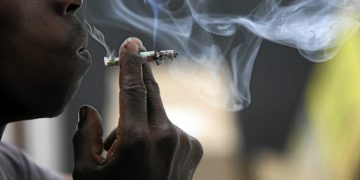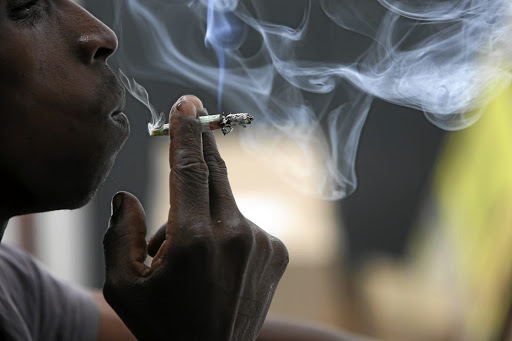By Chioma Iruke
….We Make Minimum Of N100,000 A Day In Gwarimpa Alone- Seller
After carefully arranging the cannabis, it is then wrapped in brown papers and glued with a bit of saliva and lite up. A huge drag is taken by one of the customers and the smoke puffed into the air making the aura of the smoker a bit hazy. From a distance, the smell of weed can be perceived, making the area a red alert for night movement.
Nigeria’s drug problem over the years has been a subject of great concern for many, with cities like Lagos and Abuja being the epicenter of drug activities. The issue seems to deteriorate as time passes, as every week, we hear of the arrest of a syndicate or a trafficker by the National Drug Law Enforcement Agency, NDLEA.
According to a report by the United Nations Office on Drugs and Crime (UNODC) the drug use prevalence in Nigerians aged between 15 and 64 years, is approximately 15 percent and this is three times the global drug use prevalence of 5.5 per cent.
The severity of the situation becomes evident as the report further suggested that Cannabis used by 10.6 million Nigerians is the most common used drug, followed by opioids with 4.6 million, including tramadol. This is in addition to the fact that 1 in every 4 individuals using drugs, is a woman and 1 in 5 who had used drug in the past year is suffering from drug user disorder.
A research conducted by the Journal of Addiction Research & Therapy in 2015 with 14,059 questionnaires being distributed, of which 10,609 (88.9%) were analyzed, suggested that 1401 people in the FCT were using drugs with 53.5% being male and 46.5, females.
It is expected that the number must have increased or even doubled in the FCT, as drugs have become one of the easiest commodities to purchase, with sales done in Gardens, parks, and on the streets.
In this report by The Heritage Times, a sweep was carried out around prominent areas where drugs are sold in the FCT.
Drug sale Locations
Douala Cresent, Wuse Zone 5, Abuja, has become a perpetual hub for the sale of hard drugs with the National Union of Road Transport Workers (NURTW) park beside the park owned by the All Saints Anglican church being their unofficial office.
On Saturday, May 15 when Heritage Times visited the area at around 5pm, sales had already begun with many street sellers accosting our correspondent just by Jaiz bank.
The street which is sometimes busy, is taken as a short route towards Zone 2, as well as Wuse Market and Zone 6 for a walking commuter. By the junction, many residents tolling the Nyanya axis are standing awaiting a ride home. As busy as the area is, these sellers have no form of insecurity or fear, as they sell these illegal substances with utmost boldness, calling names like, weed, rizler, refnol, codeine, coke, crack, molly, ecstasy, LSD, loud e.t.c. While Heritage Times was negotiating the price of weed, an unidentified police man in uniform entered the park to buy any of the illicit substances.
After carefully arranging the cannabis, it is then wrapped in brown papers and glued with a bit of saliva and lite up. A huge drag is taken by one of the customers and the smoke puffed into the air, making the aura of the smoker a bit hazy. From a distance, the smell of weed can be perceived making the area a red alert for night movement.
Heritage Times also visited the old Special Anti-Robbery Squad (SARS) office popular called ‘abattoir’ in Garki area of the FCT, and observed almost the same occurrence. The most fascinating of these similarities is that these areas tend not to be secluded and the activities of illicit drug traders are done very much in the open with residents being aware of what goes on, as it goes on.
Other sales outlet visited where the business thrives are Area 1, Apo, Maitama, Asokoro, Kado Estate, Kubwa, Sun City, Games Village, Lugbe, Ademola Adetokunbo , Old Abattoir and other neighboring villages in the FCT.
The substance is mostly patronized by young men and in some instances, ladies as young as 16 years old. From the few hours spent by our reporter, it was also observed that members of top politicians, civil servants, prostitutes, artisans and students and the armed forces, police as well also patronized the area.
While the prices of these substances differ between locations, a dealer we spoke to in the 3rd Avenue Axis of Gwarimpa known to be the biggest drug hub, noted that as a result of the economic hardship, a pack of weed now sells for N500, making it almost three times its previous price.
According to the seller who pleaded anonymous, while a pack of weed sells for N500, it is sold to retailers for N300 for profits to be made.
“We sell it in bulk at N300 for those Aboki boys, they in turn can sell it N500 or N600 depending on them. But to be honest, it’s the suppliers that make the money. Those retailers are always high on the drugs they sell so how can they make money. In fact, the Aboki boys are sometimes under a bigger boss. In fact, they are just puns,” the dealer said.
The seller further disclosed that they make as much as N100,000 per day from selling packs of weed just within the Gwarimpa axis. He noted that home deliveries were also available for those who wanted to be discrete and security conscious, while many retailers make their sales in Kadobiko junction.
According to the source, while collateral can be accepted in exchange for cocaine, not every dealer would accept such payment except cases where one was sure of the costumer. This was due to deceptions accompanied with the use of collateral.
He further revealed that a pinch of cocaine sold for N5,000, a gram sold for N15,000, while a Kilo is about a N100,000. A dealer at a popular hemp spot in Nyanya, Abuja, Mallam Jibril Danasabe, confirmed that he makes a lot of money selling drugs, especially at Night. He also revealed that both the soldiers and the police patronize him at night and sometimes give them referrals.
“As you can see, I have almost 200 wraps of weed, before the end of today they will buy it all. This thing should be legalized in Nigeria. The demand is astronomical. People like saying that it is garage boys that smoke Igbo but it is not true. People that patronize us include politicians, students and even office men that come and hide under our sheds here and smoke. After smoking, they will spread perfume to cover the scent,” he said.
“Oga, I dey sell plenty every day. Plenty boys dey come my shop come buy am well-well. Some go even park their big-big cars come buy am,” another seller noted.
A Police ASP, who preferred anonymity, said that the force had in recent time apprehended and prosecuted the culprits. “As a law enforcement agency we cannot fold our hands even though the National Drug Law Enforcement Agency, NDLEA, is saddled with such responsibility to handle it, but we have been and still raiding them.
“Smokers of Indian hemp are one of our major prerogative areas because we believe that after taking the illegal drug some of them get motivated to commit crimes such as arm robbery, rape and other related crimes.
“There are bad eggs in every organization, we cannot verge for them or exempt them from the crime but any police office caught in the hideout of the Indian hemp smokers involved will be tried and prosecuted or may even face dismissal from the force.
“This drugs does not do anybody any good but harm, persons indulging in the act should remember that after taking the substance it vanishes in a little while from their mind and the person becomes the normal he/she that is running away from challenges.
“In this case we advise them that no matter whatever challenges you are facing in life work toward attitudinal change, stick to prayers and your God and believe that one day it will come to pass instead of taking solace with drugs,” he said.
Another police officer told Heritage Times that it was not the duty of the police to arrest drug peddlers or consumers. The officer who accepted that it was not professional for the police to be found consuming drugs, further insisted that the NDLEA bears the burden of arresting and persecuting consumers and peddlers of illicit drugs.
Another resident identified as Usman, said that many uncompleted buildings scattered around FCT has been converted to drug haven. “There is virtually no uncompleted building in Abuja where drug dealers and criminals don’t use as there hide outs. Sometimes I wonder if security men are alive to their responsibilities,” he said.
Reacting to this, the spokesperson for the NDLEA, Femi BabaFemi stated the Agency was aware of the activities of illicit drug peddlers and were actively trying to put an end to them.
“Yes we are aware of their activities in Area 1, Wuse Zone 1, Zone 5, Ademola Adetokunbo, Old Abattoir, behind Old SARS. I’m mentioning the blind spots for you, so these are all drug spots in Abuja we raid them virtually every week for instance in that Zone 5 we have decided to establish an NDLEA post (Sub-station) that enables us move closer to that spot and we are monitoring the development in all of these joints. We raid them frequently that I can assure you,” he said.
Giving more details to their raids, the NDLEA spokesman said; “I just confirmed from our records of operations that Gwarimpa was raided yesterday (May 24).
“Last Friday we also arrested a dispatch rider who came with people to drop some drugs there (Gwarimpa) because they probably didn’t know we have some undercover agents there. We were able to recover the bags there and the rider.
“Zone 5 was raided just last week. So there’s hardly any week that these blind spots are not raided.”
On long term plans of the Agency in curbing illicit drug peddling within the FCT, he said: “You know the drug problem is something that has predated and its beyond, drug supply reduction. What we are doing hovers on intercepting, assisting and at the same time, arresting the drug traffickers, but beyond that, we are trying to do what is called drug reduction; that is educating those that are yet to be on drugs and letting them know the dangers of what they are consuming and proving help for those who are on it either through rehabilitation or providing treatment for them.
“So it’s a multifaceted mopping approach strategy and not just about mopping up the drugs, arresting the culprits. It goes beyond that and we need to get into the mind of the people which is what we are doing through our advocacy programs. So definitely with the support of everybody, including the media it’s a problem that is solvable.”




































